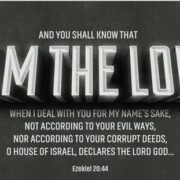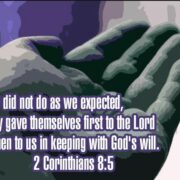PROVOKED THE LORD WITH IDOL OFFERINGS
The Lord was offended by the Israelites because they saw pagan shrines in the high hills and they worshipped. They provoked the Lord with their sacrifices, their libations, and incense offerings which were presented to pagan deities. God called them to account for their conduct by asking, “What is the high place to which you are going?” That was how those pagan shrines came to be called bamah, i.e., high place.
God is asking us, “What is the high place to which you are going?” Maybe it’s the luxury car or the luxury house you bought, which is the reason why you withheld your tithes and offering. Maybe it was the high credit card bill because you are under the yoke of excessive spending. What other gods are you bringing your offering to?
How are you offering to idols? When you look at your finances, you can determine if you are in the trap of idolatry? What are you spending on the most? Does it bring glory to God?
On the other hand, you can also evaluate your thought patterns. Are you God-centered or man-centered? Is the reason why you are not bringing in your tithes and offering because you feel you’ll be in lack? You would not be able to make ends meet. Do you think the Lord would command you to give to His ministry without providing for you?
You may not offer directly to Baal or other gods that the Israelites had name for. However, the Enemy has disguised idolatry in the modern times. It can be fame, pride, power, wealth, greed, lust, and a whole lot of other things. Narcissism is a powerful idol among this generation. People have been seeking after all these other things, instead of seeking the Lord for them. Anything that takes the place of the Lord in your life is idolatry.
People have devoted time to creating perfect social media profiles. They spend a lot on vacations, clothes, and shoes just so they can show the world their glory. However, they have neglected the work of the Lord. They took for granted the ministry of God. Instead of bringing in their tithes and offering, they are drowning in debt, trying to buy things they couldn’t afford in the first place.
If we are honest with ourselves, if we truly question why it is an issue for us to bring in the tithes and the offering, we would discover an idolatrous heart. We are creatures who are made to worship. Our natural tendency is to bring in our offerings in worship of something. The only question is if we choose the right object of worship.
Your weekly dose of prophetic wisdom and anointing awaits you. Join our LIVE Conference Call!
1) Call 515-604-9266
2) Go to startmeeting.com, and use the login: BishopJordan













